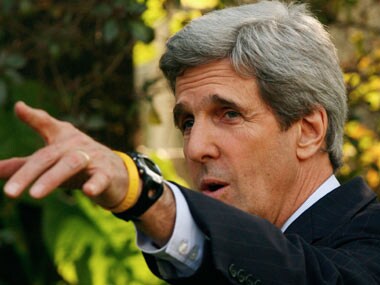New York: US President Barack Obama is sending secretary of state John Kerry, Washington’s new top diplomat to India to expand strategic cooperation and iron out the issues stalling the actual implementation of the India-US civil nuclear energy deal. During his visit, expected to take place in mid-June, Kerry will also co-chair the Indo-US strategic dialogue with external affairs minister Salman Khurshid and try to push nuclear energy commerce. “US, sources said, is keen to finalise the early works agreement on nuclear reactors and settle the liability issue so as to clear the decks for actual nuclear commerce to begin,” reported the Daily Mail. [caption id=“attachment_687161” align=“alignleft” width=“380”]  During his visit, Kerry will also co-chair the Indo-US strategic dialogue with external affairs minister Salman Khurshid and try to push nuclear energy commerce. Reuters[/caption] When former President George W Bush and Prime Minister Manmohan Singh signed the nuclear deal in 2008, it was heralded as a new era in post-Cold war ties and US companies hoped to reap a bonanza in reactor sales. In June last year, Westinghouse Electric Co. and the Nuclear Power Corporation of India (NPCIL) finally signed a preliminary pact for an Early Works Agreement (EWA) for installation of the first 1,000 MW American nuclear reactor in Gujarat. The EWA includes preliminary licensing and site development work. However, the US says there is still lot of work to be done including understanding the implications of India’s civil nuclear liability law. US nuclear companies have voiced reservations at some provisions of the liability legislation saying they are tough on suppliers of reactors. American firms have been unwilling to shoulder the kind of liabilities India is insisting on. Diplomats from Washington have been in talks with their counterparts in New Delhi over how liability is determined in an accident. In 2010, India’s parliament passed a nuclear liability act that made companies liable to pay compensation without monetary limit in the event of a nuclear accident. But India posted new rules called “Civil Liability for Nuclear Damage Rules 2011,” effectively limiting the liability on foreign suppliers and imposing time constraints on claimants seeking compensation. The new rules implementing the act have laid a cap of Rs 1,500 crore as damages that can be claimed by a plant operator from reactor suppliers in the event of faulty equipment causing an accident. The rules also set a five-year time limit within which the operator can claim damages from the supplier. This is a departure from the earlier clause in the nuclear liability bill that made nuclear equipment suppliers liable for 80 years in the event of an accident. Other sources of energy like natural gas will also be a key component of the strategic dialogue. The global energy map is being redrawn by the resurgence in oil and gas production in the US. Amid the emergence of the US as an energy superpower, India is turning to America as a new source for imports. The US is open to the supplies of liquefied natural gas to energy-hungry India, though it will have to get its domestic laws tweaked to make an exception for India. Washington doesn’t allow gas exports to any country with which it doesn’t have a Free Trade Agreement, but it is making an exception for India’s state run energy giant GAIL India. GAIL has managed to lock down a 20-year import deal to buy liquefied natural gas (LNG), from Houston-based Cheniere Energy. New Delhi is now pressing Washington to relax its restrictive export policy for other Indian companies. “Energy trade is of strategic interest on both sides, and should be prioritized,” Nirupama Rao, India’s ambassador to the US, told the Center for Strategic and International Studies, said earlier this month. “Its elements should include export of US natural gas and other fossil fuel to India. I wish to emphasize the high importance we attach, both at governmental and private sector levels, to opening up the export of shale gas from the United States to India,” added Rao. The Daily Mail noted that while former secretary of state Hillary Clinton created the right foundations for the strategic dialogue, South Block will be anxiously looking forward to Kerry’s visit, given his reputation of being soft on Pakistan. Backed by Kerry, US aid to Pakistan is already flowing. The Obama administration has sent to the Congress on December 7, Pakistan’s tab for a $688 million payment that constitutes Islamabad’s bill for providing infrastructural support to the US in its war in Afghanistan. In 2009, Kerry was the co-author of the Kerry-Lugar-Berman law which authorized a five-year $7.5 billion payout to Pakistan subject to conditions
US President Barack Obama is sending secretary of state John Kerry, Washington’s new top diplomat to India to expand strategic cooperation and iron out the issues stalling the actual implementation of the India-US civil nuclear energy deal.
Advertisement
End of Article


)

)
)
)
)
)
)
)
)



